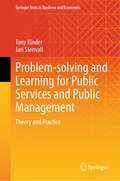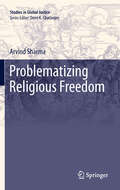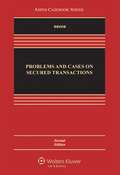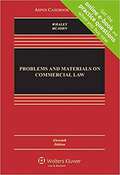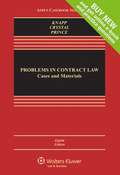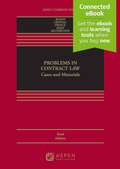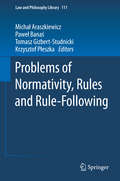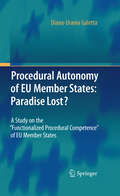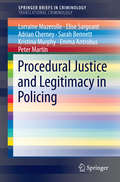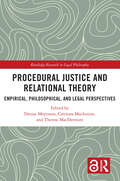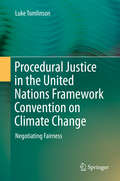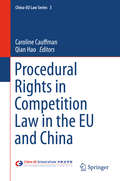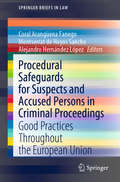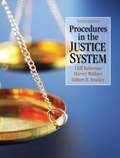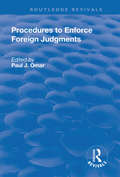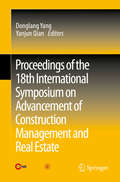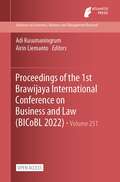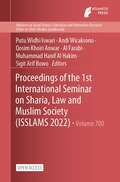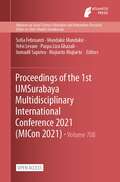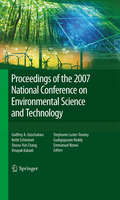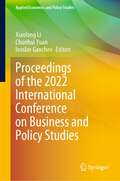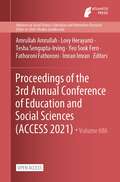- Table View
- List View
Problem-solving and Learning for Public Services and Public Management: Theory and Practice (Springer Texts in Business and Economics)
by Jari Stenvall Tony KinderIn this textbook readers will acquire knowledge of problem-solving and learning to enhance both efficiency and the experience of service users in rapidly changing service environments, that can create new service models. Emphasizing that, above all else, individuals are at the centre of services, the book goes deeply into the nature of public services and their logic-of-practice. By applying learning and problem-solving approaches, the reader gains practical capabilities in addition to an appreciation of the latest research literature. Following a multidisciplinary, international approach, the book suggests a new typology of problem-framing and presents many examples of how new service solutions can be created in any public service context. The book offers a conceptual toolkit to understand and analyse dynamically changing services and the application of new technologies. Topics covered include pressing issues surrounding public services, such as e-technology, digitalisation, e-services, artificial intelligence, entrepreneurialism, sustainability, climate, inequality, developing economies, and smart cities. Chapters follow a similar structure: issue, problems, what we know, learning framework, worked example, theory and practice conclusions, as well as teacher and learner notes. Addressing advanced undergraduate and graduate students of public administration, public management, political science, sociology, computer science, and information systems, the book will also be a valuable resource for practitioners, i.e. experts and managers in public organizations, professionals in organizations working at the business and public sectors, consultants, and IT suppliers.
Problematizing Religious Freedom
by Arvind SharmaThe concept of religious freedom is the favoured modern human rights concept, with which the modern world hopes to tackle the phenomenon of religious pluralism, as our modern existence in an electronically shrinking globe comes to be increasingly characterised by this phenomenon. To begin with, the concept of religious freedom, as embodied in Article 18 of the Universal Declaration of Human Rights, seems self-evident in nature. It is the claim of this book, however, that although emblematic on the one hand, the concept is also problematic on the other, and the implications of the concept of religious freedom are far from self-evident, despite the ready acceptance the term receives as embodying a worthwhile goal. This book therefore problematizes the concept along legal, constitutional, ethical and theological lines, and especially from the perspective of religious studies, so that religious freedom in the world could be enlarged in a way which promotes human flourishing.
Problems and Cases on Secured Transactions
by James BrookThe problem approach featured in Problems and Cases on Secured Transactions thoroughly engages students with imaginative scenarios, presenting the material as easily accessible and as manageable as possible without avoiding the intricacies of secured transactions. Students come to appreciate that the principal resource for the course is UCC Article 9 itself. While the casebook is an essential tool for study, the law is found in the Code. Problems and Cases on Secured Transactions is carefully designed for an introductory mainstream course, not for an advanced course or seminar. The material is presented as completely comprehensible, even enjoyable rather than an arcane science than only an insider can understand. Cases are heavily edited, and liberal editorial note help express the vibrancy of true-life situations. A good mix of short and long problems gives each lesson a comprehensive linear flow while keeping students focused. A progressive mix of problems helps students see the common elements, as rules and principals learned in a simpler setting can readily be applied to more complex transactions. Earlier problems lean more heavily, though not exclusively, on the individual and consumer-borrower situations. As the lessons advance, the mix of materials progressively includes more small-business and large-business transactions. The Second Edition updates problems that highlight the changes made by the 2010 Revisions to Article 9, to become effective in 2013. Recently decided cases, applying the 2001 revision to Article 9, have been added as well. Features: problem approach engages students with imaginative scenarios accessible and manageable, without losing complexity underscores UCC Article 9 as principal resource for the course The casebook is a tool; the law is in the Code. makes material completely comprehensible, relevant, and enjoyable, not arcane cases are heavily edited and noted to express vibrancy of individual true-life stories specifically designed for introductory course, not an advanced course or seminar a mix of short and long problems throughout the text gives each lesson a comprehensive linear flow keeps students focused shows the study of Secured Transactions as far more than a mechanical exercise a progressive mix of problems helps students appreciate the common elements shows how that principals learned in a simpler setting can readily be applied to more complex transactions Earlier problems lean toward individual and consumer-borrower situations. Later problems progressively mix more small-business and large-business transactions. Thoroughly updated, the revised Second Edition presents: Updated problems that highlight the changes made by the 2010 Revisions to Article 9, to become effective in 2013. Recently decided cases, applying the 2001 revision to Article 9
Problems and Materials on Commercial Law (Aspen Casebook Series)
by Douglas J. Whaley Stephen M. McJohnClear, lucid, and extremely accessible, Problems and Materials on Commercial Law helps students understand black letter law and the statutory language in the Uniform Commercial Code. Concise yet comprehensive coverage includes the most recent case and statutory developments in all fundamental areas of Commercial Law, including sales, payment systems, and secured transactions. A sensible, flexible organization follows the order of UCC Articles 2, 3, 4, and 9, and is adaptable to many teaching styles. Drawing on experience in both teaching and writing, the authors provide thorough and practical coverage using a popular problem approach. <p><p>The text s effective format, manageable length, and inclusion of the most important cases make Problems and Materials on Commercial Law concise and efficient. A Teacher s Manual provides sample syllabi, answers to all the problems in the text, and suggestions on the best ways to teach various topics.
Problems in Contract Law: Cases and Materials (Aspen Casebook)
by Charles Knapp Nathan Crystal Harry PrinceProblems in Contract Law: Cases and Materials, offers a balance of traditional and contemporary cases that reflect the development and complexity of contract law. Explanatory notes and text place classic and contemporary cases in their larger legal context. Questions and problem exercises bridge theory and practice. Adaptable for instructors with different teaching techniques, this successful book includes various perspectives and contractual settings and offers a highly intelligent, contemporary treatment of contract law. It can easily be used in teaching by traditional case analysis, through problem-based instruction, or using theoretical inquiry.
Problems in Contract Law: Cases and Materials (Aspen Casebook)
by Charles L. Knapp Nathan M. Crystal Harry G. PrinceIn Problems in Contract Law: Cases and Materials, Ninth Edition, by Charles L. Knapp, Nathan M. Crystal, and Harry G. Prince, a balance of traditional and contemporary cases reflect the development and complexity of contract law. Explanatory notes and text place classic and contemporary cases in their larger legal context, while questions and problem exercises bridge theory and practice. <p><p> Adaptable for instructors with different teaching techniques, this successful book includes various perspectives and contractual settings, and offers a highly intelligent, contemporary treatment of contract law. It can easily be used in teaching by traditional case analysis, through problem-based instruction, or using theoretical inquiry.
Problems in Contract Law: Cases and Materials (Aspen Casebook)
by Charles L. Knapp Nathan M. Crystal Harry G. Prince Danielle K. Hart Joshua M. SilversteinProblems in Contract Law: Cases and Materials, by Charles L. Knapp, Nathan M. Crystal, Harry G. Prince, Danielle K. Hart, and Joshua M. Silverstein, includes cases with notes and explanatory text, additional commentary, essay, and short-answer problems, and multiple-choice review questions for each chapter. The cases selected are a balance of traditional and contemporary that reflect the development and complexity of contract law. Explanatory notes and text place the classic and newer decisions in their larger legal context. Questions and problems provide opportunities to practice core legal skills and encourage students to explore the relationship between theory and practice. This successful book is well known for approaching contract law and theory from multiple perspectives and using a variety of contractual settings. Adaptable for instructors with different pedagogical philosophies, Problems in Contract Law can easily be used in teaching by traditional case analysis, through problem-based instruction, or using theoretical inquiry.
Problems of International Politics: Compliant Rebels
by Hyeran JoSeventeen million people have died in civil wars and rebel violence has disrupted the lives of millions more. In a fascinating contribution to the active literature on civil wars, this book finds that some contemporary rebel groups actually comply with international law amid the brutality of civil conflicts around the world. Rather than celebrating the existence of compliant rebels, the author traces the cause of this phenomenon and argues that compliant rebels emerge when rebel groups seek legitimacy in the eyes of domestic and international audiences that care about humanitarian consequences and human rights. By examining rebel groups' different behaviors such as civilian killing, child soldiering, and allowing access to detention centers, Compliant Rebels offers key messages and policy lessons about engaging rebel groups with an eye toward reducing civilian suffering in war zones.
Problems of Normativity, Rules and Rule-Following
by Michał Araszkiewicz Paweł Banaś Tomasz Gizbert-Studnicki Krzysztof PłeszkaThis book focuses on the problems of rules, rule-following and normativity as discussed within the areas of analytic philosophy, linguistics, logic and legal theory. Divided into four parts, the volume covers topics in general analytic philosophy, analytic legal theory, legal interpretation and argumentation, logic as well as AI& Law area of research. It discusses, inter alia, "Kripkenstein's" sceptical argument against rule-following and normativity of meaning, the role of neuroscience in explaining the phenomenon of normativity, conventionalism in philosophy of law, normativity of rules of interpretation, some formal approaches towards rules and normativity as well as the problem of defeasibility of rules. The aim of the book is to provide an interdisciplinary approach to an inquiry into the questions concerning rules, rule-following and normativity.
Procedural Autonomy of EU Member States: Paradise Lost?
by Diana-Urania GalettaIs the procedural autonomy of EU Member State a myth or a reality? What should this concept be taken to mean? Starting from the analysis of requirements and principles regulating, generally speaking, the relationships between Member States' and EU law, this book provides a definition of procedural autonomy able to account for the concept's inherent limits. Out of an analysis of the more relevant EU jurisprudence, the author identifies the rationale underlying the interventions of the ECJ on issues of procedural autonomy and the common logic that emerges from it; and reveals how, in an unchanged context of 'procedural autonomy' of the Member States, national procedural law becomes more and more 'functionalized' to the requirements of effectiveness of substantive EU law. As such, we should speak of a 'functionalized procedural competence' rather than of procedural autonomy. But this is by no means a case of "Paradise Lost." The book includes a foreword by Prof. Jürgen Schwarze, one of the founding fathers of European Administrative Law.
Procedural Justice and Legitimacy in Policing
by Peter Martin Adrian Cherney Sarah Bennett Lorraine Mazerolle Elise Sargeant Kristina Murphy Emma AntrobusThis brief focuses on the "doing" of procedural justice: what the police can do to implement the principles of procedural justice, and how their actions can improve citizen perceptions of police legitimacy. Drawing on research from Australia (Mazerolle et al), the UK (Stanko, Bradford, Jackson etc al), the US (Tyler, Reisig, Weisburd), Israel (Jonathon-Zamir et al), Trinidad & Tobago (Kochel et al) and Ghana (Tankebe), the authors examine the practical ways that the police can approach engagement with citizens across a range of different types of interventions to embrace the principles of procedural justice, including: · problem-oriented policing · patrol · restorative justice · reassurance policing · and community policing. Through these examples, the authors also examine some of the barriers for implementing procedurally just ways of interacting with citizens, and offer practical suggestions for reform. This work will be of interest for researchers in criminology and criminal justice focused on policing as well as policymakers.
Procedural Justice and Relational Theory: Empirical, Philosophical, and Legal Perspectives (Routledge Research in Legal Philosophy)
by Denise Meyerson, Catriona Mackenzie, and Therese MacDermottThis book bridges a scholarly divide between empirical and normative theorizing about procedural justice in the context of relations of power between citizens and the state. Empirical research establishes that people’s understanding of procedural justice is shaped by relational factors. A central premise of this volume is that this research is significant but needs to be complemented by normative theorizing that draws on relational theories of ethics and justice to explain the moral significance of procedures and make normative sense of people’s concerns about relational factors. The chapters in Part 1 provide comprehensive reviews of empirical studies of procedural justice in policing, courts and prisons. Part 2 explores empirical and normative perspectives on procedural justice and legitimacy. Part 3 examines philosophical approaches to procedural justice. Part 4 considers the implications of a relational perspective for the design of procedures in a range of legal contexts. This collection will be of interest to a wide academic readership in philosophy, law, psychology and criminology.
Procedural Justice in the United Nations Framework Convention on Climate Change
by Luke TomlinsonThis book considers what is needed for fairness in the decisions of the UNFCCC. It analyses several principles of procedural fairness in order to develop practical policy measures for fair decision-making in the UNFCCC. This includes measures that determine who should have a right to participate in its decisions, how these decisions should take place and what level of equality should exist between these actors. In doing so, it proposes that procedural fairness is a fundamental feature of a multilateral response to address climate change. By showing that procedural fairness is most likely to be achieved through the inclusive process of the UNFCCC, it also shows that global efforts to address climate change should continue in this forum.
Procedural Rights in Competition Law in the EU and China
by Caroline Cauffman Qian HaoThe book examinesthe rights of defendants in infringement procedures and those of the notifyingparties in merger proceedings before the European Commission and the Chinesecompetition authorities. The initial chapters offer a general introduction toEU and Chinese competition law respectively, paying particular attention to thesubstantive rules of competition law. Subsequent chapters present an overviewof the procedural rights of the notifying parties in merger cases in both legalsystems surveyed, address the procedural rights of defendants in infringementcases, and provide an international perspective on differences in the notification and enforcement procedures between legal systems. The final chapter drawscomparative conclusions and includes a number of suggestions for improvement.
Procedural Safeguards for Suspects and Accused Persons in Criminal Proceedings: Good Practices Throughout the European Union (SpringerBriefs in Law)
by Coral Arangüena Fanego Montserrat de Hoyos Sancho Alejandro Hernández LópezAdopting a practical perspective, this book provides a comprehensive analysis of the Directives adopted by the European Union concerning the rights of and safeguards for suspected and accused persons in criminal proceedings. It is the result of a collaboration between scholars and legal practitioners, and the first work of its kind to examine all relevant rights and safeguards in a single volume. The book offers readers panoramic, functional and in-depth insights into the EU legal framework and related European case law, and highlights the main issues and gaps identified by the authors in legal practice. In addition, it provides recommendations, guidelines and effective solutions applicable to criminal proceedings.
Procedures in the Justice System (10th Edition)
by Cliff Roberson Harvey WallaceProcedures in the Justice System, 10e, is comprehensive yet readable. Designed for one-semester courses on American criminal courts, it covers the court systems and processes using a sequential approach-following law violators from arrest to conviction and sentencing. Each chapter examines the roles that law enforcement agencies, courts, and correctional departments play in the process, and builds logically on previous material. Down-to-earth examples, illustrations, court documents, and cases help make procedures more real and concrete.
Procedures to Enforce Foreign Judgments (Routledge Revivals)
by Paul J. OmarThis title was first published in 2002: Within Europe and beyond, foreign judgement enforcement is now an essential component for the development of international commerce. This indispensable volume traces and analyzes steps and procedures for the enforcement of foreign judgements in national courts, including summarizing the principles which are the preconditions for that enforcement.
Proceedings of the 18th International Symposium on Advancement of Construction Management and Real Estate
by Donglang Yang Yanjun QianThe Chinese Research Institute of Construction Management (CRIOCM) in collaboration with Xi'an Jiaotong University proudly invites all academics, researchers and professionals to participate in the CRIOCM 2013, the 18th International Symposium on "Advancement of Construction Management and Real Estate". We will uphold and preserve the idea and tradition of pragmatism and innovation, to offer an excellent academic and communication platform for academics and professionals to exchange information on the latest developments in real estate and construction management.
Proceedings of the 19th International Symposium on Advancement of Construction Management and Real Estate
by Liyin Shen Kunhui Ye Chao MaoThese conference proceedings cover an outstanding view for academics and professionals to share research findings on the latest developments in real estate and construction management. The Chinese Research Institute of Construction Management (CRIOCM) in collaboration with Chongqing University organized CRIOCM2014, the 19th International Symposium on "Advancement of Construction Management and Real Estate. " The proceedings collect 105 selected papers addressing the following key themes: Sustainable Urbanization, Sustainable Construction, Urban Construction and Management, Affordable Housing, Urban Land Development and Utilization, Management for Large Infrastructure Projects, Green Construction Materials and Construction Waste Management, Development and Management for Mountainous Towns, Advancement of Construction Project Management, Redevelopment in Disaster Areas, Law and Policies for Construction and Real Estate, Information Technology for Construction Management and Real Estate and lastly Other Topics.
Proceedings of the 1st Brawijaya International Conference on Business and Law (Advances in Economics, Business and Management Research #251)
by Adi Kusumaningrum Airin LiemantoThis is an open access book.The advancement of science is an important basic for the country’s development. It should be supported by the analysis which could provide solutions of various problems and phenomena happened in society. One of the problems amidst the problems around the world is how to resolve the economics and social problem as a result of the COVID-19 Pandemic. The complex problems due to pandemic are not merely believed to be bias if it is solved by a science so that it needs collaboration of other social sciences. Due to these issues of social science, we are conducting the 1st Brawijaya International Conference on Business and Law (BICoBL) 2022 on the 27th of October, 2022 in Bogor. The theme of the conference entitles “Collaboration of Business and Law After Pandemic to Enhance Sustainable Development”. We are looking forward to having you in our conference.
Proceedings of the 1st International Seminar on Sharia, Law and Muslim Society (Advances in Social Science, Education and Humanities Research #700)
by Putu Widhi Iswari Andi Wicaksono Qosim Khoiri Anwar Al Farabi Muhammad Hanif Al Hakim Sigit Arif BowoThis is an open access book. Wael B. Hallaq, a renowned sharia scholar, has called sharia an ‘episteme’ that suffered a ‘structural death’ following the dawn of modernity in the nineteenth and early twentieth centuries (Hallaq 2009, 15–16). Yet, its resurgent is remarkable across a number of jurisdictional fault-lines: from Muslim-majority nations in Middle East and Southeast Asia to Muslim-minority societies in Western Europe and North America. Across these jurisdictions, the relationship between sharia and state law is central. It includes sharia-state encounters, notably in the form of (state) Islamic law, in the field of family law, which is often asserted as the ‘core’ or ‘last stronghold’ of sharia (Moors 2003, 2; Coulson 1969, 115–6), and other substantive areas of law, such as Islamic economics and Islamic philanthropy and also jinayah (Islamic penal law). Regardless of their differences in their own specific context, these areas somehow manage to secure an importance place in the modern days. It involves different loci of authority to interpret, legislate, and enforce sharia, or parts of it that not only flourish but also being challenged around the Muslim world. Equally important are implications of the increasingly unsettled authority of apparently agreed-upon substance of sharia. To contribute on these issues, we would like to invite scholars from diverse discipline including law, anthropology, and Islamic studies, working in both Muslim-majority and Muslim-minority contexts, to present their works in our International Seminar on Sharia, Law, and Muslim Society (ISSLaMS).
Proceedings of the 1st UMSurabaya Multidisciplinary International Conference 2021 (Advances in Social Science, Education and Humanities Research #708)
by Sofia Februanti Mundakir Mundakir Yelvi Levani Puspa Liza Ghazali Jumadil Saputra Mujiarto MujiartoThis is an open access book. Internationalization is one aspect of becoming qualified in this globalization era, especially for higher education levels. In this particular era when everyone is locked down due to Covid 19 Virus, the academic activity must still run. It is correlated with vision of Universitas Muhammadiyah Surabaya as an international standard university so that it can compete with universities at national or international level. During Pandemy, many obstacles occur then it is also led with many opportunities.
Proceedings of the 2007 National Conference on Environmental Science and Technology
by Vinayak Kabadi Gudigopuram Reddy Emmanuel Nzewi Stephanie Luster-Teasley Godfrey Uzochukwu Shoou-Yuh Chang Keith SchimmelThe Third National Conference on Environmental Science and Technology was held in Greensboro, N.C., on September 12-14, 2007. The purpose of the conference was to address pollution prevention needs, solutions, and research, and to foster relationships that could result in partnerships needed to protect and sustain the environment and improve the quality of life. The book contains the following topics: pollution prevention, fate and transport of contaminants, bioremediation, bio-processing, innovative environmental technologies, global climate change, and environmental justice and ethics.
Proceedings of the 2022 International Conference on Business and Policy Studies (Applied Economics and Policy Studies)
by Xiaolong Li Chunhui Yuan Ivoslav GanchevThis proceedings volume contains papers accepted by the 2022 International Conference on Business and Policy Studies (CONF-BPS 2022), which are carefully selected and reviewed by professional reviewers from corresponding research fields and the editorial team of the conference. This volume presents latest research achievements, inspirations, and applications in applied economy, finance, enterprise management, public administration, and policy studies. CONF-BPS hopes this volume could be inspiring and of academic value.Business and policy studies both are heated research topics and are related to multiple fields. Held by Eliwise Academy, CONF-BPS aims at bringing together intellectuals from related fields including applied economy, finance, and public administration for academic exchange. Its goal is to serve as an international platform for researchers to present latest research progress, share ideas and inspirations, and exchange experience. Through more academic communication and exchange, this conference hops to promote international corporation and joint initiatives in relevant fields. This volume will be of interest to researchers, academics, professionals, and policy makers in the field of business, economics, management, and policy studies.
Proceedings of the 3rd Annual Conference of Education and Social Sciences (Advances in Social Science, Education and Humanities Research #686)
by Amrullah Amrullah Lovy Herayanti Tesha Sengupta-Irving Yeo Sook Fern Fathoroni Fathoroni Imran ImranThis is an open access book.Faculty of Teacher Training and Education of the University of Mataram proudly presents the 4th Annual Conference on Education and Social Science (ACCESS) in 2022. ACCESS is an iconic international scientific forum which discusses new ideas and innovations—especially those related to education and pedagogy, generally in relation to sciences and technology. Since 2019, ACCESS has been attended by hundreds of participants from various different countries such as the United States, Malaysia, Australia, Philippines, Japan, Singapore, and so on.
